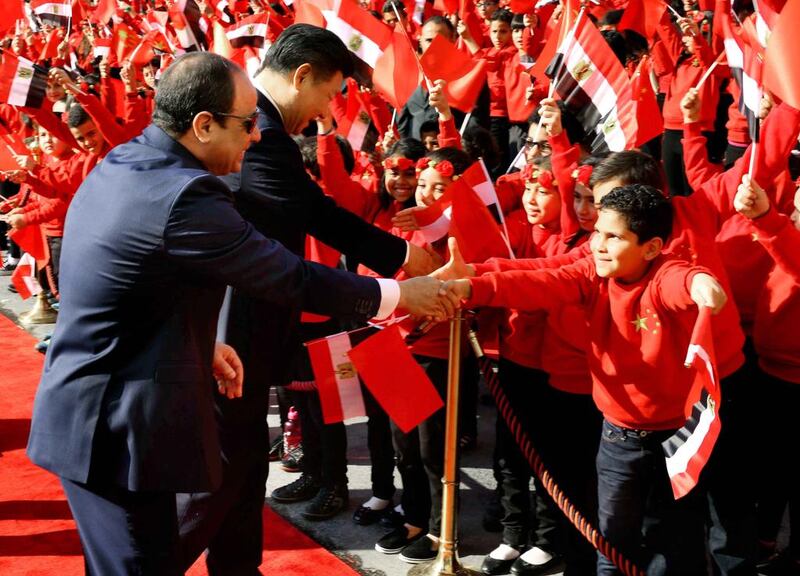CAIRO // Billions of dollars in special loans and investments to the Middle East was announced by China on Thursday – including the establishment of a common investment fund worth US$20bn for the UAE and Qatar.
In his address to the Arab League in Cairo, China president Xi Jinping offered $55bn (Dh202bn) of financial support to the region.
Mr Xi also signed deals worth $15bn with Egypt after holding talks with his Egyptian counterpart Abdel Fattah El Sisi.
Mr Xi is on his first tour to the Middle East as president as Beijing seeks to boost its economic ties in the region.
He arrived in Cairo on Wednesday after visiting King Salman in Saudi Arabia, and will travel to Iran on Friday.
“China will offer $15bn as special loans for industrial projects in the Middle East,” he told the Arab League.
Another $10bn would be provided as commercial loans to boost cooperation in the energy sector and an equivalent amount will be offered as preferential loans, he said.
An investment fund worth $20bn will also be established with Qatar and the UAE.
Talking of the $15bn deal, Mr Xi said in a joint statement with Mr El Sisi: “The two sides have agreed to undertake 15 projects ... mainly in sectors like electricity, transportation and infrastructure.”
State television broadcast the live signing at a presidential palace in Cairo.
Mr El Sisi said the agreements were the “best evidence of the two countries’ determination to improve their levels of cooperation”.
Mr Xi had earlier expressed China’s backing for Egypt running its affairs without outside interference in an article on Al Ahram, a state-run newspaper.
“China supports the people of Egypt in making independent choices for the future of their own country,” he wrote.
He also said China supported Egypt “playing an active role in regional and international affairs”.
Beijing has long taken a backseat to other diplomatic players in the Middle East.
But analysts say the region is crucial to Mr Xi’s signature foreign policy initiative – known as “One Belt One Road” – touted as a revival of ancient Silk Road trade routes.
China, the world’s second-largest economy, also relies heavily on oil and gas imported from the Middle East.
“We are not setting up proxies or building a sphere of influence in the region,” Mr Xi told the Arab League.
Mr Xi’s visit to Egypt comes just ahead of the January 25 anniversary of the 2011 revolution that removed long-time Egyptian autocrat Hosni Mubarak.
The toppling of Mubarak was followed by unrest and a military removal of his successor Mohammed Morsi, the country’s first freely elected president.
While he was in Saudi Arabia, Mr Xi met King Salman and oversaw the opening of a joint-venture oil refinery in the Yanbu industrial city on the Red Sea. Saudi Arabia is China’s biggest global supplier of crude.
The Saudi Press Agency reported on Wednesday that the two countries decided to establish a “comprehensive strategic partnership”.
During his visit to Riyadh, Mr Xi had been expected to seek to ease tensions between Saudi Arabia and its Shiite rival Iran.
Saudi Arabia and a number of its Sunni Arab allies broke diplomatic ties with Tehran earlier this month after protesters angry over Riyadh’s execution of a prominent Shiite cleric ransacked Saudi diplomatic missions in Iran.
Iran and Saudi Arabia back opposing sides in a range of Middle East conflicts, including in Syria and Yemen, and there are fears the row could derail diplomatic efforts to resolve them.
Mr Xi was expected in Tehran on Friday, just days after sanctions were lifted when Tehran implemented its historic nuclear deal with world powers.
China, with the United States, Britain, France, Germany and Russia, was among the countries that reached the agreement with Iran in July to curtail its nuclear activities in exchange for ending international sanctions.
* Agence France-Presse





